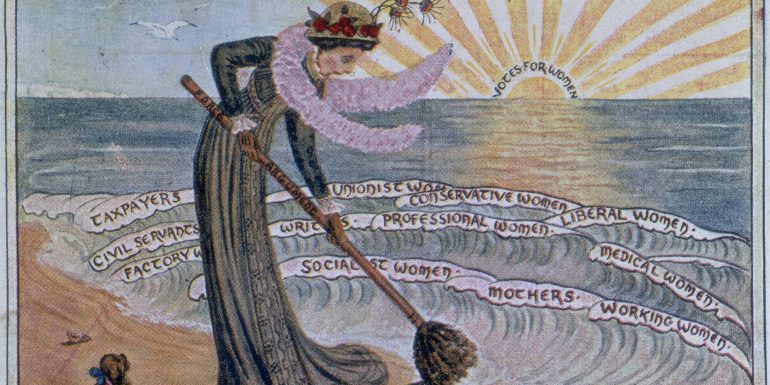In how many years will a woman with the same skills and supplies as a man have the same opportunities to find a job, enjoy the same salary, have the same development prospects or even work under the same conditions? If we try to give this answer by appreciating today's data at a global level then we will be bitterly disappointed. The answer is in 217 years, ie 2.234. It will take an average of a century to reduce the overall gap between men and women globally, including all critical aspects of work, education, health and political participation.
If these forecasts are included in its annual report World Economic Forum, Global Gender Parity Stalls for 2017, in total 144 countries seem gloomy to you, unfortunately there are other, even more ominous findings: For the first time since the publication of this research began in 2006, inequalities between men and women, instead of decreasing, have increased. In the field of labor, in fact, the gender gap has widened for the fourth consecutive year and has now returned to 2008 levels.
As highlighted in the report, it is recorded "A setback, after a decade of slow but steady progress in improving gender equality."
In particular, as far as Greece is concerned, the picture reflected in the annual report can be read in various ways, since on the one hand it shows an increase in the overall score in the period 2006-2017, although from 68th place it fell to 78th (it is pointed out, however, that the number of countries in which developments in this area are examined from 115 to 144). Of course it is in the last positions in terms of reducing inequalities at the level of Western European countries which as a whole records the highest performance in reducing the gender gap in the world. Of course, Greece from 2009 onwards is experiencing the biggest economic crisis of recent decades and this is a factor that can not be ignored.
But the way to read this kind of research is multiple. THE HuffPost Greece addressed to Secretary General of Gender Equality, The Mr. Fotini Kouvela which points out an extremely interesting element of the research: the progress steps taken from 2016 to 2017: The rise of our country by 14 points and "At the same time, the ranking of Greece in 78th place instead of 92nd in 2016 is a great development on a global scale, from which - in spite of the times - we draw additional courage to continue to diffuse our policies and actions, aiming each time to higher performance. " He emphasizes that this development constitutes a recognition of the work of the Secretary General herself.
Of course, it is worth noting that Greece is in the last positions in terms of reducing inequalities at the level of Western Europe, which as a whole records the highest performance in reducing the gender gap in the world.
Ο Klaus schwab however-its founder and executive director World Economic Forum, sends a very clear message - advice (or warning) to all countries and those in the decision-making centers: "We are moving from the age of capitalism to the age when talent will dominate. Competitiveness at national and business level will be determined more than ever by the innovative capacity of a country or a company. "Those who will achieve more are those who understand that the goal will be achieved by integrating women, as predictable forces, into the group of the talented."
Some of the key findings of the 361-page annual report are:
- Inequalities worldwide at a glance
At the level of 144 countries, the gap between men and women has been reduced by 68%, which is the average based on the progress of countries and their individual developments in four key areas: participation in the economy and opportunities, participation in politics and exercise of power, participation in education levels, health.
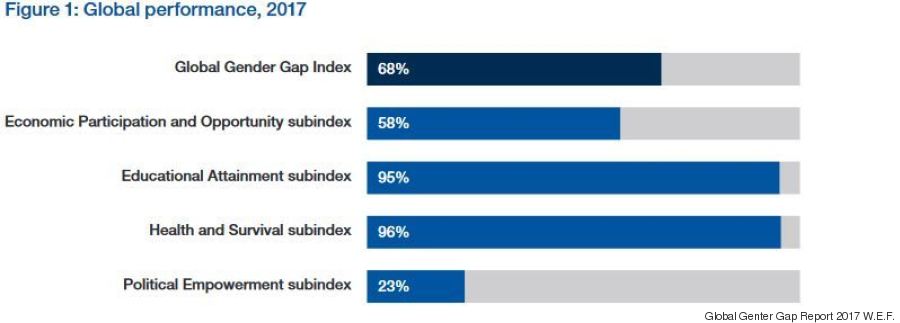
The biggest progress as shown in the graph, has been made in the last two sectors while in the first two the progress in 2017 could be characterized as extremely poor.
- Equality; In 100 years though…
Behind this overall decline is the widening gap between men and women in all four pillars studied by experts. While the report emphasizes that at the current rate it will take a century to reduce the overall gender gap, from 83 years last year.
"The areas where gender inequalities continue to be the most difficult to overcome are the economy and health." while "The political divide is the one in which gender inequalities are most pronounced and may take 99 years to reduce", underlined in the report.
Given the current trends, however, the gender gap in education can be eliminated within the next 13 years, which may include other sectors such as the economy and political participation, although so far this has not been observed.
In fact, as Ms. Kouvela emphasizes, the findings of the report at the global level are "worrying" since this series also focuses on "the extremely slow pace of progress towards achieving full equality between women and men worldwide" and adds: "In the Middle East and North Africa region, it will take 580 years to eliminate gender inequalities, while a prosperous Western Europe will need another 47 years to eliminate gender economic inequalities if the current pace continues. "Especially for Europe, the prevailing austerity policies to deal with the crisis have resulted in the reduction of the welfare state with reflection and regression on gender equality issues.
Read also:
Point of view:
- The countries with the best performance.
Iceland remains at the top as it has managed to reduce the inequality gap by 88% and for the past nine years remains the country with the highest levels of equality. Norway and Finland complete the trio with small differences, but the performance of other countries, such as Rwanda or the Philippines, is surprising.
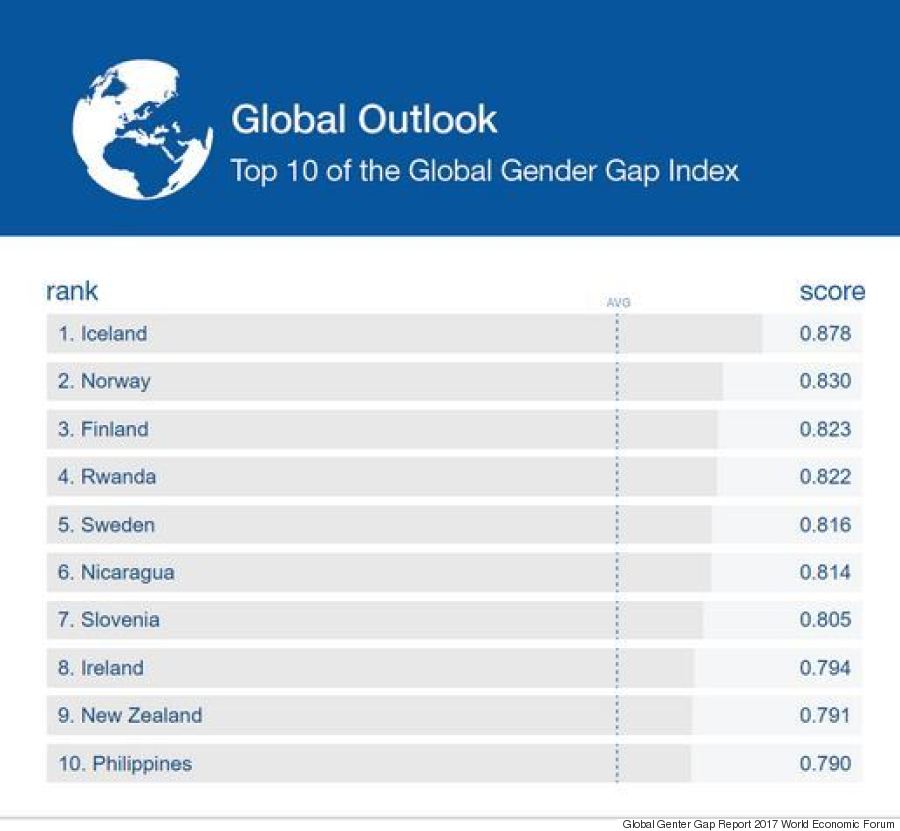
Respectively at the level of G20 countries at the top (and in 11th place in the world) is France, followed by Germany, the United Kingdom, Canada and South Africa.
- Greece of regression, stagnation or progress?
The picture in our country, however, is heartbreaking not only because it is in 78th place in the world but because in the period 2006-2017 there seems to have been a significant setback, instead of progress, in issues of gender equality which is reflected in all four key areas are examined.
In particular, in terms of participation in the economy and opportunities, the country from 2006 to 2017 fell from 69th to 73rd place if we look at the overall picture in all four areas but there seems to be an increase in the overall score from 0.654 to 0.692. In the economy, it fell from 70th to 73rd, but again showing an increase in the rating. In education, the picture from 2006 until today remains the same in terms of scores, although there is also a change in the ranking from 46th to 76th. Slight decline in scores and health with also securing a lower position (from 53rd to 89th). Only in terms of participation in politics the decline was less than 87th to 88th while there is a significant increase in the score. It is noted that in 2006 the research concerned 115 countries and not 144 as today and the comparison here is made in depth of 11 years. As it seems, Greece is lagging behind in terms of "competition" in this sector, while in the period in question it has recorded less progress than many other countries as can be easily seen in the detailed scores recorded in the report for each separately and in the overall ranking. .
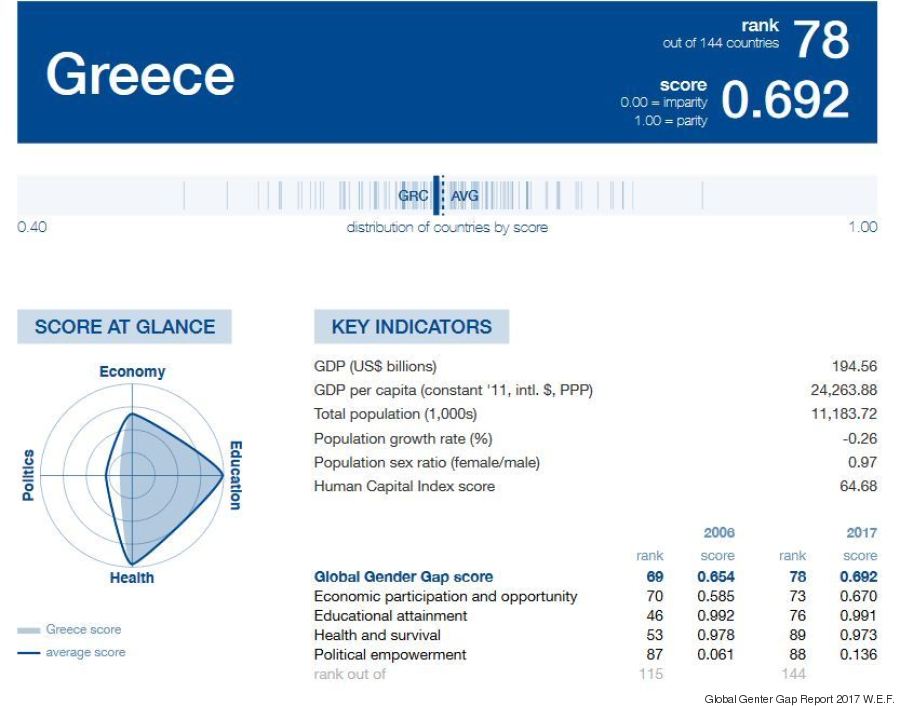
Looking at each of the four indicators, individual aspects we observe our country has the poorest performance in the participation of women in work (80th place), in taking positions as senior officials, managers and legislators (86th), in the participation in secondary and higher education (104th and 94th place), with the participation of women in Parliament (91st place).
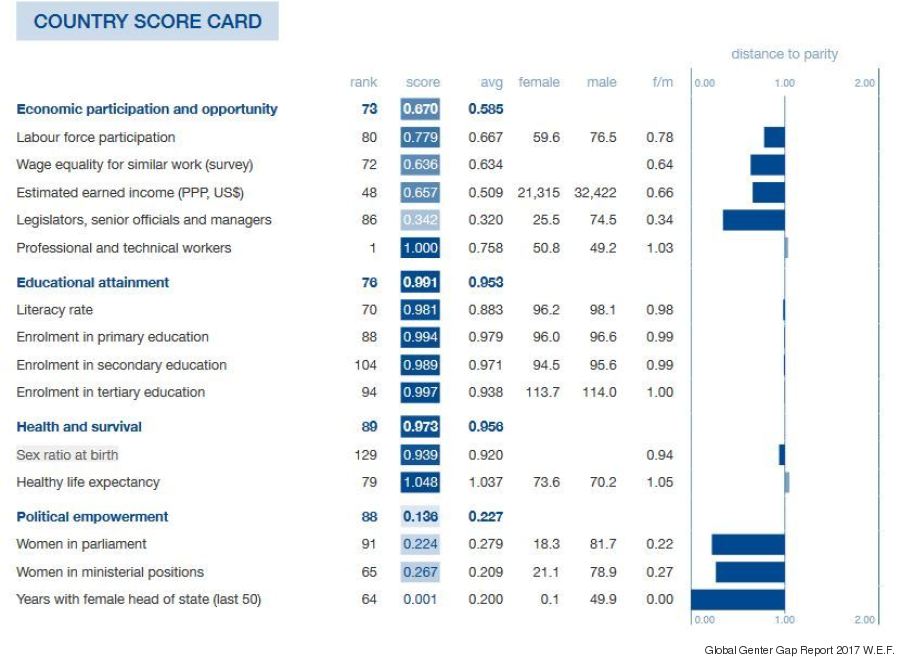
- Developments by regions
The countries of Western Europe are the ones with the highest performance with only 25% of the estimated gap remaining to be reduced, with Norway, Finland and Sweden standing out. Greece, as already pointed out along with Italy, Cyprus and Malta are in the last places.
Η North America, with countries like the US and Canada, following the example of Western Europe since it is estimated that the remaining gap in gender equality is 28%. Its countries follow Eastern Europe with 29%, with Slovenia, Bulgaria and Latvia making the most progress.
The corresponding percentage in Latin America and the Caribbean is at 30% while Nicaragua and Bolivia stand out. And Brazil is among the countries that have completely reduced the gap in the field of education.
At East Asia and the Pacific, 32% left while here we meet the two countries that are in the top 10 in the world for their progress, New Zealand and the Philippines.
The picture in sub-Saharan Africa is mixed and gender disparities are chaotic. On the one hand we have Rwanda and Namibia which progress that raises them to the top of the world list, 4th and 13th respectively and countries like Mali and Chad which are in 139th and 141st.
At South Asian countries there is still a 34% gap to be filled while the Middle East and North Africa are the regions with the highest percentage (40%).
Source: HuffPost
